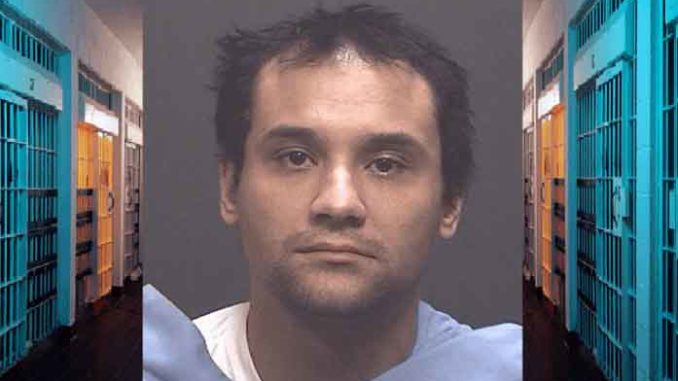
Phone calls made to a prior attorney by a Tucson man who could be sentenced to death if convicted of the murder of two young girls cannot be listened to by anyone but his current attorneys unless it can be shown he gave up his right to attorney-client privilege, the Arizona Supreme Court ruled this week.
Christopher Matthew Clements faces the death penalty if convicted at trial next year of abducting and killing Isabel Celis and Maribel Gonzales. He is currently being held in the Pima County jail in lieu of a $2,000,000 cash bond since his indictment on 22 felonies in 2018.
RELATED ARTICLE: Man Indicted For Murders Of Maribel Gonzales, Isabel Celis
Clements, 38, was in the Maricopa County jail in 2018 on charges unrelated to the disappearance of girls when he reportedly made more than two dozen calls to John Kaufmann, an attorney who represented Clements years earlier. A message was provided to the inmate that calls may be subjected to monitoring and recording.
The Pima County Attorney’s Office asked the judge presiding over the death penalty case to appoint a “special master” to review 27 recorded jail calls between Clements and Kaufmann. A special master is usually an attorney or retired judge who is appointed to solve a dispute between the State and the defendant so that the trial judge doesn’t learn information that could create a bias later on.
The dispute in Clements case is whether the calls with Kaufmann are protected under the attorney-client privilege, or whether Clements waived that privilege by speaking to an attorney on a recorded jail phone.
According to Chief Justice Robert Brutinel, the Arizona Supreme Court heard Clements’ petition for review in order to clarify “the process and burden of establishing attorney-client privilege and litigating challenges to the privilege” as both issues are of “statewide importance.”
The opinion authored by Brutinel states the trial court may consider whether Clements failed to treat the communication with the attorney as confidential, and thus failed to establish privilege. However, Clements may also raise “any arguments regarding unreasonable restrictions on his ability to confer with counsel or potential intrusions into the attorney-client relationship by the State that would constitutionally prohibit the State’s use of the phone calls even if it demonstrated Clements waived the privilege.”
Court records show Clements was awaiting trial in Pima County on burglary charges in early 2017 when he became a person of interest after his then-fiancée told federal authorities Clements had information about the April 2012 disappearance of 6-year-old Celis.
Clements insisted he did not kidnap or kill Celis, but he led investigators to her remains in the same area where authorities found the body of 13-year-old Gonzales in June 2014. DNA evidence connecting Clements to Gonzales was purportedly found near her body, while clothing and school materials which may have belonged to Celis were found buried on property where Clements once lived in Tucson.
However, Clements was not immediately charged in the deaths of either girl.
Then while in the Maricopa County jail on other charges, Clements placed several calls to Kaufmann. The jail’s policy is to record all jail calls except those placed to phone numbers on the State Bar of Arizona’s attorney roster.
But Clements’ calls to Kaufmann went to the attorney’s home number, not his office number on file with the State Bar. Pima County prosecutors handling the death penalty case contend Clements waived his attorney-client privilege even though he used the only phones allowed for calling an attorney.
The State also contends it didn’t matter that Kaufmann told jail officials he was providing legal advice to Clements.
Brutinel’s opinion questions the practice of some jails designating only certain attorney phone numbers as not subject to monitoring. The chief justice pointed out “the reality” is many attorneys now use cell phones or even a second office line for calls.
“If an inmate has no practical way to communicate with counsel without interception, he can hardly be said to have waived the privilege by choice or inadvertence,” Brutinel wrote.
The opinion also notes the attorney-client privilege “serves a critical function by encouraging a client to speak truthfully with his or her lawyer.” Judges must now use a four-part process to determine whether a party claiming privilege has provided sufficient evidence to raise the presumption for a specific communication.
The first step is for the proponent of privilege to show there is an attorney-client relationship. The second step is to show the communication in question involved securing or providing legal advice. There must also be a showing that the communication was made in confidence and that the communication was treated as confidential.
The phone recordings being held by the jail must now be turned over to Clements’ current attorneys for review to determine if an assertion of privilege is applicable. Once that is complete, the attorneys can seek an order from the trial court judge on whether Clements has met the four-part test for privilege on any of the recordings.
The State could still demonstrate that a special master is needed to review privileged communications for evidence of a crime-fraud exception. The exception applies when “a reasonable person” would believe the communication between an attorney and client is in furtherance of a crime, tort, or fraud.
But in Clements’ case, Pima County prosecutors already concede they cannot meet that burden. So if the trial court judge determines Clements’ proves privilege then the recordings between he and Kaufmann are off-limits to the prosecutors and detectives.
Clements was formally indictment by a Pima County grand jury in September 2018. He is represented in the capital murder case by Tucson-based attorneys Eric Kessler and Joseph DiRoberto, and he faces the death penalty if convicted at trial of either murder charge.

